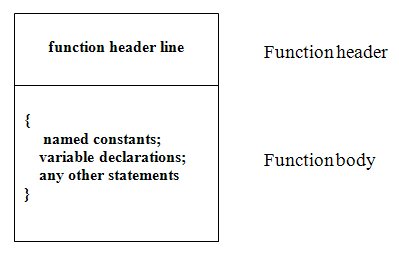| << Chapter < Page | Chapter >> Page > |
In C++ all subprograms are referred to as functions . A function allows you to treat a related group of C++ statements as a single unit. The programmer can write functions to define specific tasks that could be used at many points in a program.
Functions allow the programmer to modulize a program. All variables declared in function definitions are local variables – they are known only in the function in which they are defined. Most functions have a list of parameters that provide the means for communicating information between functions.
There are several motivations for dividing a program into functions. The divide-and-conquer approach makes program development more manageable. Another motivation is software reusability – using existing functions as building blocks to create new programs. Software reusability is a major factor in object-oriented programming. With good function naming and definition, programs can be created from standardized functions that accomplish specific tasks. A third motivation is to avoid repeating code in a program. Packing code as a function allows the code to be executed from several location in a program simply by calling the function.
The lines that compose a function within a C++ program are called a function definition. The syntax for defining a function is
data_type name_of_function (parameters){
statements;
}
A function definition consists of four parts:
- A reserved word indicating the return data type of the function’s return value.
- The function name
- Any parameters required by the function, contained within parentheses.
- The function’s statements enclosed in curly braces { }.
Example: The following function determines the largest integer among three parameters passed to it.
int maximum( int x, int y, int z )
{
int max = x;
if ( y>max )
max = y;
if ( z>max )
max = z;
return max;
}
You designate a data type for function since it is common to return a value from a function after it executes.
General format of a function is described below.

Variable names that will be used in the function header line are called formal parameters.
To execute a function, you must invoke, or call, it from the main () function.
The values or variables that you place within the parentheses of a function call statement are called arguments or actual parameters.

Notification Switch
Would you like to follow the 'Programming fundamentals in c++' conversation and receive update notifications?